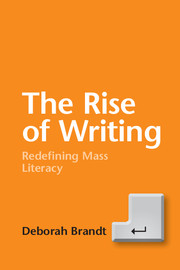4 - When everybody writes
Published online by Cambridge University Press: 05 January 2015
Summary
There was a time in the not-so-distant past when illiterate citizens were a protected class in the US justice system. Throughout most of the nineteenth century, being unable to read did not disqualify individuals, for instance, from serving as jurors in court proceedings. Further, if their illiteracy led them into financial exploitation by others, those others could be held liable. Illiteracy was understood as a potential vulnerability yet not a stigma. By the early twentieth century, however, as Edward Stevens (1988) has demonstrated, the obligation to read had become thoroughly structured into social and legal relations. Illiterate people became ill-fitted to the practices of the court, and if they signed a contract without knowing what the words said, it was too bad for them if things went wrong. As illiteracy slid into stigma, the inability to read became increasingly punishing. Instead of being accommodated, illiterate people had to accommodate to the risks of living in a reading world. We might understand this shift simply as an inevitable outcome of rapidly rising literacy rates and expanding education. But Stevens shows the deeper churnings in the relationship between literacy and justice, as the presumed condition of universal literacy helped to fuel a buyer-beware way of doing business that altered the legal security of illiterate citizens.
Stevens captures a change in what some might call a literacy mentalité. Mentalities is a concept developed by sociologically oriented French historians of the mid-twentieth century who sought relationships between social structures at any given time or place and the shared understandings that people in that time and place used to get along in life. Dissatisfied with traditional historical research with its focus on wars, politics, big events, singular individuals, or intellectual elites, they set about illuminating the past in terms of the collective representations that organized and rationalized social life in different times and places. They especially were concerned with the sense-making practices of everyday people. Mentalities could limit a culture’s horizon of understanding but at the same time could be the grounds for contestation, innovation, and transformation. Early proponents of the mentalities approach, Lucien Febvre and Marc Bloch, drew from the sociological thought of Emile Durkheim to focus their early research on long-term socioeconomic processes and structures.
- Type
- Chapter
- Information
- The Rise of WritingRedefining Mass Literacy, pp. 135 - 158Publisher: Cambridge University PressPrint publication year: 2014



